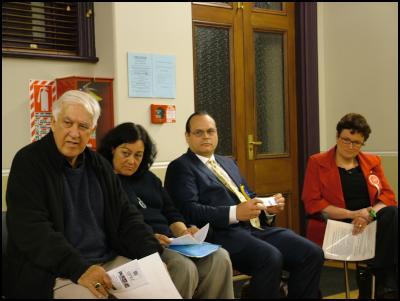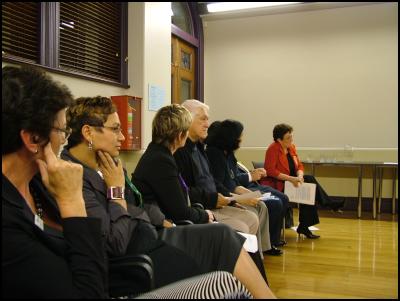The Irony & Agony Of An All Party Education Debate
Scoop Report: The Irony & Agony Of An All Party Education Debate
An education forum in Auckland this Tuesday allowed a Labour stand-in education spokesperson to perform a faux pas at election time: speaking ones mind.
Attended by all the major parties, the forum erupted into laughter as Vivian Goldsmith – a teacher standing for Labour in East Coast Bays – said she "did not pay school donations" herself and called on parents to protest against them.

Image: Moderator, Sir Paul Reeves (left), Vivian Goldsmith (far right)
"We [she and her partner] send our requests for fees directly to the minister every time we get them," she said.
She then encouraged people to lobby Chris Carter, Labour Minister of Education, on the issue of school donations, saying education should be free of charge.
"I think more people should take the challenge like I do and let the Minister know," she said.
United Future education spokesperson Judy Turner followed Ms Goldsmith and said, "current laws bar schools from demanding fees", adding that it was a murky area as many schools struggle financially.
Earlier Mr Carter had been at the forum, organised by the Quality Public Education Coalition, and before leaving he said government spending on education had doubled since 1999.
After her remarks about mounting a protest against school fees, Ms Goldsmith returned to the Labour Party "manifesto" on education.
But only after the cheers of the crowd died down.
The forum has been the only education debate of the 2008 election attended by all party spokespersons.
Two main topics emerged: lack of funding for schools and teachers, and the need to provide equality of access to quality education, regardless of decile rating.
Mr Carter warned the meeting to remember the "demoralised, under funded education sector that Labour had inherited", and not to buy into National's, "emotional slogans".
"The Labour Party is absolutely committed to a quality, well resourced education system," said Mr Carter.
Labour do not stand for private-public partnerships in schools, he said, as this creates "winner and looser schools", he said.
Mr Carter dismissed calls for more funding for private schools. He said he doesn't believe in "boot camps for kids", these only make kids "more alienated and angry".
He also disagreed with "top teacher remuneration" as this creates a hostile climate for teaching.
Anne Tolley, National Party education spokesperson said her party would match Labour's 1.75 billion of education spending, but drive out overt bureaucracy.
Although first to leave - looking a little campaign fatigued - she put effort into rebuking Labour's "pay-jolt" for teachers election policy, saying it had not been priced and during troubling economic times it was not fair to make such promises.
New Zealand's education standards had been slipped from 14th to 24th in world rankings, she said.
Mrs Tolley wants national standards for numeracy and literacy, and countywide tests in place for both.

Pictured from left: National's Anne Tolley, Green Party's Metiria Turei, United Future's Judy Turner, moderator Sir Paul Reeves, Maori Party's Bronwyn Yates, ACT Party's Peter Tashkoff (obscured), and Labour's Vivian Goldsmith.
Ms Goldsmith says the current curriculum [NCEA] needs time to develop, but is very enthusiastic that modifications underway will address any public concerns.
National want to "get tough" on children and parents regarding truancy, and give schools assistance to deal with disruptive students.
Green Party Education Spokesperson Metiria Turei won over the crowd.
She was disparaging of National's "90 day fire at will bill" and said protecting the teaching workforce was paramount.
Ms Turei said the secondary school sector was "clunky", lagging behind, and needed more money for cross curriculum education on sustainability.
Further applause welcomed her comments that international corporations were, "driving out our early childhood centers", and that school vouchers were a form of privatisation.
The need for quality public education, regardless of ability or wealth, was a point emphasised by both Mrs Turei and Maori Party list candidate, Bronwyn Yates.
Neither was supportive of private-public partnerships, and both stressed the importance of Kaupapa Maori and retaining Kohanga Reo.
Mrs Yates raised the issue of equality, saying many children feel alienated by not being able to afford extras at school such as trips and sporting equipment.
She says New Zealand needs to tackle institutionalised racism, and, " an extreme make-over of the schooling experience" is needed.
ACT Party candidate Peter Tashkoff became defensive early on, following a hostile reaction to the ACT party's voucher scheme.
He said a 300 per cent increase in the bureaucratic education structure had occurred under Labour. Labour, he said, have abused power by micro managing services throughout New Zealand.
ACT say the 4600 officials and bureaucrats running the education sector must be cut back to 500.
Mr Tashkoff believes vouchers will "empower families" by allowing every parent to send their child to a school of their choosing.
Heckled by the crowd Mr Tashkoff said, "You are a room full of people who are part of the problem".
Many candidates raised funding issues for special needs. Their comment came in the context of a complaint lodged by IHC with the Human Rights Commission against practices that prevent disabled students participating fully at school.
Labour's Ms Goldsmith agreed delivery of special needs funding was fractured, saying Ongoing and Reviewable Resourcing Schemes (ORRS) needs to be rethought.
"Under National, special education won't have to wait until three weeks before an election to get some attention," said Mrs Tolley.
Judy Turner, United Future education spokesperson, said she "cautiously" wanted to look at how teacher pay can be developed, but didn't agree with performance pay for teachers.
Another major issue highlighted at the forum was the problem of children disengaging throughout secondary school.
To combat this Mrs Turner proposed withdrawal scholarships, claiming 10 per cent of children fell into this category.
FULL RAW AUDIO (1.5
hours)
Jamie Melbourne-Hayward is an Auckland-based writer.


 Richard S. Ehrlich: China's Great Wall & Egypt's Pyramids
Richard S. Ehrlich: China's Great Wall & Egypt's Pyramids Gordon Campbell: On Surviving Trump’s Trip To La La Land
Gordon Campbell: On Surviving Trump’s Trip To La La Land Ramzy Baroud: Famine In Gaza - Will We Continue To Watch As Gaza Starves To Death?
Ramzy Baroud: Famine In Gaza - Will We Continue To Watch As Gaza Starves To Death? Peter Dunne: Dunne's Weekly - A Government Backbencher's Lot Not Always A Happy One
Peter Dunne: Dunne's Weekly - A Government Backbencher's Lot Not Always A Happy One Richard S. Ehrlich: Cyber-Spying 'From Lhasa To London' & Tibet Flexing
Richard S. Ehrlich: Cyber-Spying 'From Lhasa To London' & Tibet Flexing Gordon Campbell: On Aussie Election Aftershocks And Life Lessons
Gordon Campbell: On Aussie Election Aftershocks And Life Lessons